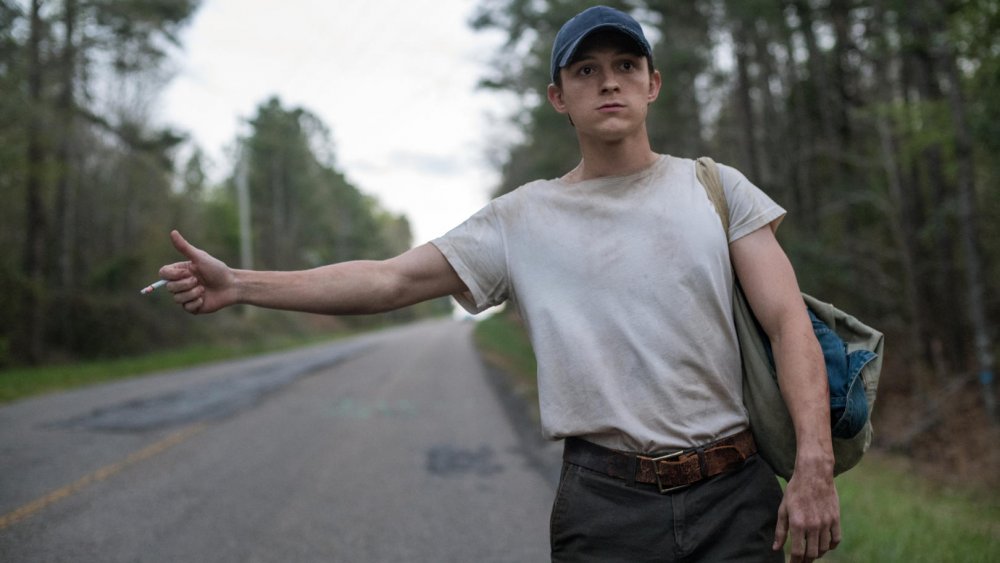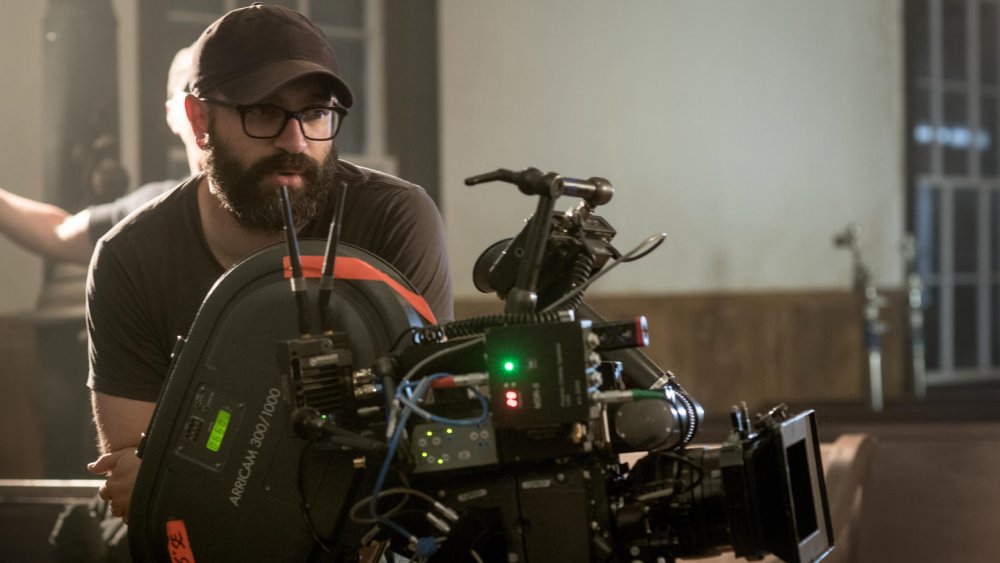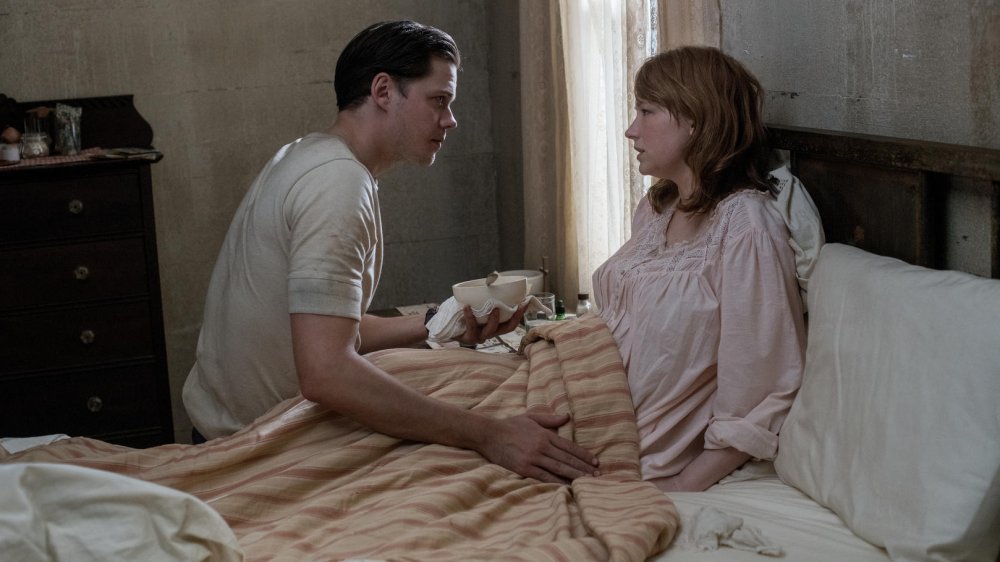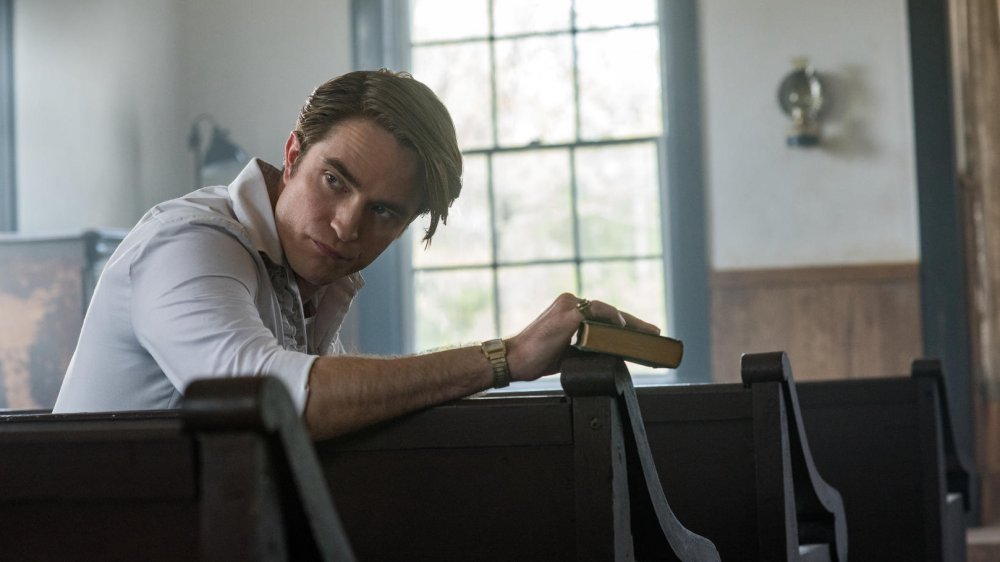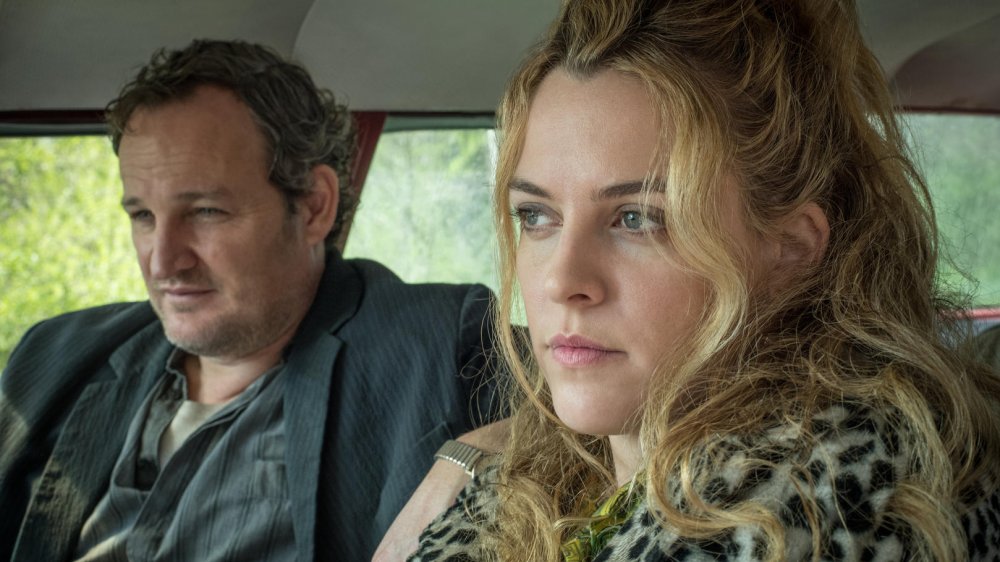Director Antonio Campos Discusses The Devil All The Time - Exclusive Interview
We've all encountered wolves in sheep's clothing at some point in our lives — two-faced people who might seem like your everyday average joe on the outside, but on the inside lurks something far more sinister. That's the theme ultimately explored in Netflix's The Devil All the Time — a gritty, and at times, downright depressing drama based on the Southern gothic novel of the same name by Donald Ray Pollock.
Spanning from the 1940s through the 1960s and set in Southern Ohio, The Devil All the Time follows the interweaving storylines of several flawed characters who are each battling their own inner demons. A bulk of them turn to extreme religion to cope with the daily struggles or past tragedies of their lives. Each major role in the film adaptation is brought to life by a powerhouse cast, including Tom Holland, Robert Pattinson, Bill Skarsgård, Sebastian Stan, Jason Clarke, and Riley Keough.
At the helm of the picture is writer-director Antonio Campos, who also directed 2016's bio-drama Christine, several episodes of USA's crime drama series The Sinner, and an episode of Marvel and Netflix's The Punisher. To help translate The Devil All The Time, Campos enlisted the services of his brother, co-writer Paulo Campos, both of them admirers of Pollock's original novel.
Now, the result of their years of hard work is finally streaming on Netflix. In an exclusive interview, Looper sat down with Antonio Campos to chat with him about his star-studded movie. Here he discusses what he and his brother loved so much about the novel, why they made some changes to the narrative, and what it's like working with an A-list cast featuring some of the biggest stars from the Marvel and DC cinematic universes.
Author Donald Ray Pollock gave his stamp of approval
What were the qualities that jumped out at you when you first read The Devil All The Time by Donald Ray Pollock? Was there one thing that made you realize you wanted to sign up and adapt this movie?
If I had to boil it down to the first thing that grabbed me, it would be the prayer log and the notion of it and trying to imagine what it looked like. And the idea of realizing that in a movie, that was the first thing that grabbed me. And then as the book progressed, I realized what it was doing and what worlds and genres it was playing with, and they happened to be two of my favorite genres, which were Southern gothic and hard-boiled fiction.
As I progressed further, I realized the dialogue or the conversation happening in terms of people's relationships with religion and this extreme kind of religion that takes hold of people, that's a kind of story that I'm really fascinated by. And then realizing, by the end of the book, that this is a generational story, that it's basically the story of what the father passed on to the son and how the son has to deal with that, and either stay trapped in that cycle or break it.
When you were adapting this for the screen, did you consult with the author at all? Were you striving to be as faithful as possible, or did you see any areas where you wanted to deviate from the novel a little bit or do something different?
My brother co-wrote it with me. We loved the book, so we wanted to capture what we loved about it and the spirit of the book, so we were conscious of being faithful to that and capturing the essence of the characters and the stories and the themes and the way it spoke about those themes, but we didn't feel trapped by the book. We didn't feel that we were obligated to play every scene the way it played out in the book, or set every scene in the same setting or sort of illustrate every character the way they might've been in the book. For instance, in the book, it's almost like the narrative is focused more on Carl (Jason Clarke), and his internal process. But Paulo and I were way more interested in Sandy (Riley Keough).
So it wasn't necessarily that we changed Sandy from the book, we just kind of got in her head more. And then there was the periphery of the Bodecker (Sebastian Stan) storyline that had a lot of stuff that we were kind of digging, so we that brought into focus. This underbelly — this guy that Bodecker is taking money from — that's alluded to in the book, but there's not a scene necessarily where that plays out. But we were taking cues from Donald. We were just taking cues from the book. And we felt like if we were faithful to the book and captured the essence of the book, that ultimately, that Don would dig it too, and he did.
Producer Jake Gyllenhaal championed the movie from the get-go
Jake Gyllenhaal is one of the producers on this. Did he provide any input or guidance during the making of the movie?
I ended up working with my stories through [Producer] Riva Marker. That's who I knew, and that's who really was the on-the-ground producer of the movie. Jake Gyllenhaal read the script and really loved it and knew my work and was excited to give his insights on the script and help get the film made and champion it with the people that we were talking to. But really, Jake didn't visit the set. Jake watched the dailies and he was aware of everything going on, but he wasn't there on the ground. That was Riva Marker. That's her job, really, to be the on-the-ground producer. Jake was around in post and watching cuts, and giving his feedback on those.
This is arguably one of the biggest casts you've worked with so far. You've got Tom Holland, Robert Pattinson, Sebastian Stan. Were these guys on board from the get-go, or did it take some wooing to lure them in?
Everybody was a little different, but for the most part, it was very organic. Rob, for instance, was a friend. We have mutual friends. We got to know each other four years ago and liked each other. He was in the middle of making Good Time when I met him, and then I showed him an early draft of the script and he really liked the character of Preston Teagardin, and so that was it. He was the first one on board and that was really cool. And then Mia Wasikowska and Tom Holland came on. His agent had read the script and it was during the time that Tom had been asked to play Spider-Man. He maybe even played Spider-Man already and the movie hadn't come out at that point, but I hadn't seen him in the role yet. They just knew my work and thought I was an interesting director to work with.
And Sebastian, I sent him the script. I really loved him as an actor, and he knew my work as well and was excited to work together and respond to this character. Riley Keough was someone that I had coffee with just because we really liked each other's work and with Bill Skarsgard, it was the same thing. And these were just general coffee meetings, they were not like, "I got a movie for you." It was really just kind of, "Hey, let's get to know each other and say hi and if anything comes up in the future that might be right, let's reach out. And that's how that happened. And then there was the sort of natural casting process of making lists and approaching actors, writing letters to actors, seeing what the audition process brought in and that kind of thing. Casting, to me — there's no magic wand. It's people you're interested in, people that you might have crossed paths with, people that you know like your work, that you haven't talked to yet. And then just making lists and being open to the audition process. That can really lead to a lot of surprises.
Antonio Campos doesn't let an actor's past roles distract from his vision
I don't know if Robert was already announced as Batman at that point, but did you have a fanboy moment where you realized you had Spider-Man, Winter Soldier and Batman, all in your own movie?
No, I did not, but I don't think Robert was Batman back then. The fact that there are three people who are in one of these cinematic universes, it did not dawn on me until after the fact. But I don't think of them as anything but the person that's in front of me. Also, if I'm working with Riley Keough, I don't think about what she did in the Girlfriend Experience, you know what I mean? I don't think about that stuff. You have to focus on the person that's in front of you and the character you're creating. If you have the baggage of other characters that they've played, it's distracting and they don't want to do that again. They do that in those movies, they want to do something different here. The thing that's funny about this, is that, at this point, I mean, The Avengers is so massive. I mean, what actor is not in there? You know what I mean? These universes are just getting so big and they attract the best actors. It's inevitable that you're going to work with a few of them. The coolest thing about this film is that these actors that have been in those movies together, in the case of Sebastian and Tom, I think in this movie, they get to do more together, even though they've been in several movies together.
As a writer-director, how flexible are you with your talent providing you with suggestions? While you're making a movie that's based on the novel like this, did Tom or Robert offer their own input or make changes to the script?
Yeah, totally. Tom would say, "What if Arvin said this?" or "I don't think Arvin would say that." Absolutely. I love that. I love that dialogue. I love that actors have strong opinions of what their character would say or not say. I don't always agree with it, but I appreciate anyone who has a strong opinion about what they're doing. If people are like, "Well, just tell me what to say. Tell me how to say it." You're like, "Well then, what's the point?" I mean, you'll do it, you'll tell them how to say it, but that's not the fun of it. And you never want to get to that place where an actor goes, "Just tell me how to say it," or "Tell me what you want." That's the worst-case scenario. That means that you guys are just really going around in circles.
This film spans three different decades: the '40s, '50s, '60s. I don't think you've done a movie set in so many time periods before. Did that pose any new challenges for you when it came to paying attention to details?
Every movie is the same set of problems, you just get more of them. You're having to design a world and figure out what kind of cars would be in this scene, and then what colors should those cars be? Who should be driving those cars? Which car should be moving, which one shouldn't be? That's a question that you have, whether a movie is set in the present day or set in the '70s or '60s or '50s. And in this case, well, there's cars from the '40s, there's cars from the '50s, there's cars from the '60s. And then you have to decide, well, what is '50s? Is the '50s things that were invented in the '50s? Or is the '50s really a lot of the stuff from the '40s? It's not like everybody has the latest car, or latest clothes or latest utensils. You got to look a few years earlier. And the people that usually are most up-to-date and current, those people probably have a lot of money and that signals something about them. So you have to think about those things when you're doing period. And in the case of this movie, we had to think about three periods and we also had to think about, how do we move through time, through production design, costume design, and music, and that's a challenge. I've done period stuff, but I've never done three periods, so you just kind of adapt and then you get a lot more people going, "Okay, well, what about this?" Being a director is a lot of people just running up to you and asking you questions that you didn't know you had to answer.
The Devil All the Time is a 'parade of grotesquery'
This is a really dark movie and there are a few characters who are despicable human beings. They are like wolves in sheep's clothing. For example, Preston's a character has that holy man façade, but he has all these inner demons. I think a lot of us have encountered two-faced people like this during our lifetime. While making this movie, did you draw from any real-life experiences?
Luckily, no. Not when it comes to that stuff, no. I know what we all know in terms of people in positions of power, in the church, in any kind of organized religion, taking advantage of believers and their congregants, that I did think about. People molding someone who's susceptible to that kind of manipulation. My closest connection to it was just sort of the relationship with religion and trying to explore my own thoughts and struggles, and the interest is in observing people. Part of why I make movies is to observe people that I don't necessarily know and want to get to know and want to get to understand. And I think that the thing is, there are a lot of dark characters, but I don't think it's unbearable. I think the film goes to dark places, but it does so in a way where you can feel for someone in those scenes. It's not like it's just this onslaught of nightmares. There's a humanity at play, even with some of the most despicable characters. And there are a lot of elements that provide levity to the world, whether it be the voice of the narrator, a pop music cue, or just a little bit of goofiness in a kind of weird scene. I don't know, I think Robert's performance at the end, in that church, is equal parts disgusting and hilarious.
The way he turns, and you see the wolf under that sheep's clothing, and he's not talking like a preacher anymore. He's like, "Man, come on." All of a sudden, he's lost all the performative quality. The whole act drops when he's confronted, and he just becomes this pathetic guy begging for his life, trying to explain this horrible thing he did. Or even Jason Clarke's character when he's trying to convince Roy to have sex with his wife so he can take pictures. It's a ridiculous scenario. The movie is playing with some absurdity, too. Southern gothic is a kind of parade of grotesquery. There is the horror of every day that's then put through a funhouse mirror and reflected back, and that's what you're looking at. The movie is really kind of like, not a reflection of reality, but a funhouse mirror reflection of reality. And that's Southern gothic, that's the grotesquery of every day.
You directed an episode of Netflix's The Punisher and now you've worked with Tom Holland and Sebastian Stan. What's next for you? Do you see yourself doing another film like The Devil All The Time or maybe another Marvel-related project now that you have an in? Especially after working with Tom and Sebastian.
I really love those movies and I think that, if I found my way into that — I think the best of those movies are the ones where the director comes in with a very specific take and changes it up and shakes it up a little bit. My favorite one of those movies is Thor: Ragnarok. Because I think [director] Taika Waititi just put a spin on everything and it's so fun. So I would never be opposed to it, if I could find the right way into that. The thing that's right in front of me right now is, I'm turning the Michael Peterson case into a limited series. Michael Peterson is the subject of the documentary The Staircase, which is on Netflix. And it's a murder trial, a very complicated, twisty murder trial that happened in the early 2000s and I'm adapting that with a few other writers and we have Harrison Ford attached to play Michael Peterson. My focus right now is trying to get those scripts in and trying to figure out when we can shoot it.
